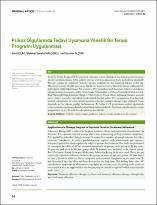Psikoz olgularında tedavi uyumuna yönelik bir terapi programı uygulanması
Citation
Yazla, E., Karadere, M. E., Ölçüm, H. İ. (2019). Psikoz olgularında tedavi uyumuna yönelik bir terapi programı uygulanması. Bilişsel Davranışçı Psikoterapi ve Araştırmalar Dergisi, 8(2), 94-99.Abstract
Tedaviye Uyum Terapisi(TUT) literatürde “anlaşılan tedavi etkinliği ve ilaç kullanma motivasyonu” olarak tanımlanmaktadır. Tıbbi tedaviye uyumu arttırmayı amaçlayan, hasta merkezli bir girişimdir. Bireysel seanslar ile uygulanır. Tedaviye uyumu etkileyen bir dizi karmaşık faktörü hedef alır. Hastaların tedaviye yönelik inançlarını düzenleyen motivasyonel ve bilişsel davranışçı yaklaşımlar ile psikoeğitim birlikteliği kullanır. Bu araştırma, TUT’ninpsikoz tanılı hastaların tedaviye uyumlarına etkisini incelemek amacıyla yapıldı. Araştırmada 26 hasta olgu ve 24 hasta kontrol grubunda yer aldı. Kısa Psikiyatrik Değerlendirme Ölçeği ve Tıbbi Tedaviye Uyum Ölçeği kullanıldı. Gruplar arasında yaş ve cinsiyet açısından istatistiksel olarak anlamlı bir fark yoktu. TUT programının kısa dönemde hastalık semptomları ve tedavi uyumu üzerinde iyileştirici etkisinin olduğu tespit edilmiştir. Uzun dönemde ise bu etkinin azaldığı bulunmuştur. Bu bulgu TUT programının psikoz olgularında tedavi uyumunu arttırmaya katkıda bulunduğunu göstermektedir. Araştırma sonuçlarına göre terapi programının en geç altı ayda bir tekrarlanması önerilebilir. Adherence Therapy(AT) is defined as “implicit treatment efficacy and motivation of medication” in literature. It is a patient centered attempt which aims at increasing medical treatment compliance. It is applied by individual therapy sessions. It makes for a number of complex factors that affect treatment compliance. It utilizes psychoeducation together with motivational and cognitive behavioral approaches which regulate the beliefs of patients for treatment. This study was performed to investigate the effect of AT on treatment compliance of patients with psychosis. In the study, 26 patients took place in the case group while 24 patients were included in the control group. Brief Psychiatric Rating Scale and Medication Adherence Rating Scale were used. There was no statistically significant difference between the groups in terms of age and gender. AT was found to have a beneficial effect on disease symptoms and treatment compliance in the short term. It was determined that this effect had been decreased in the long term. This finding shows that AT contributes to improvement of treatment compliance in psychotic cases. According to the results of the research it may be suggested that the therapy program should be repeated within semi-annually at the latest.
Source
Bilişsel Davranışçı Psikoterapi ve Araştırmalar Dergisi / Journal of Cognitive-Behavioral Psychotherapy and Research (JCBPR)Volume
8Issue
2Collections
- Makale Koleksiyonu [517]
- TR-Dizin İndeksli Yayınlar Koleksiyonu [1602]


















